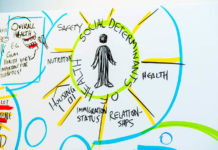Study Explores Meanings of Bipolar Disorder to Those Diagnosed
The narratives about Bipolar Disorder promoted by drug companies may influence how those diagnosed understand themselves.
More Research Needed on Climate Change-Related Ecological Grief
Researchers outline the concept of ecologically driven grief due to climate change and recommend future research to better understand the psychological impact of climate change.
Psychologists Argue for Decolonial Approach to Global Poverty
Individualist psychological models of poverty pathologize poor communities, decolonial approaches that emphasize context and interdependence may be more sustainable.
More to Happiness Than Feeling Good, Study Finds
Cross-cultural data suggest that happiness involves feeling the emotions one deems as right, in accordance with personal and cultural values.
Mediterranean Diet Improves Mental Health, Study Finds
A diet rich in fruits, vegetables, whole grains, nuts, and fish has repeatedly been found to improve mental health.
Correcting Misconceptions of Trauma-informed Care with Survivor Perspectives
Trauma-informed approaches have the potential to promote recovery but must involve survivors and service-users to prevent the experience of retraumatization within psychiatric and mental health services.
Psychology Must Become a Sanctuary Discipline to Heal Racial Trauma
Researchers explore pathways of healing racial trauma in Latinx immigrant communities.
Lay Health Worker Intervention Effective at Decreasing Symptoms
Compared with standard care, results of a lay health worker intervention in Zimbabwe suggest that this is effective for reduction of common mental health symptoms
Challenging Resilience as a Buzzword: Toward a Contextualized Resilience Model
Researcher Dr. Silke Schwarz highlights how Western psychology’s construction of individual resilience deflects emphasized individual pathology and deflects efforts at structural change.
Study Finds Greening Urban Land Improves Mental Health
Remediating dilapidated physical environments in urban settings can contribute to better mental health.
Exporting Psychological Concepts Associated With Gender May Have Unintended Consequences
New qualitative research finds a shift in the meaning of gender as it enters the local lexicon of people in rural Malawi, in turn having negative ramifications for those it is meant to help.
Researchers Push for Transparency of Mental Health Outcome Data
A new analysis of UK mental health data suggests the way organizations deliver mental health services can alter patient outcomes.
Mobile Apps for Mental Health Lack Transparency in Data Sharing
Research illustrates privacy concerns with how mental health applications collect and share users’ data.
Large German Anti-Stigma Campaign Shows Little Effect on Attitudes
“Overall, this study showed that the information and awareness campaign had almost no significant effects on the general public's attitudes toward people affected by either schizophrenia or depression,” the researchers, led by German medical sociologist Anna Makowski, wrote. “One could assume that deeply rooted convictions cannot be modified by rather time-limited and general activities targeted at the public.”
Targeting Hypocrisy Reduces Islamophobia and Collective Blame of Muslims
Interventions calling attention to participants’ hypocrisy proved effective in reducing Islamophobia and collective blame of Muslims for individual acts of violence.
First Systematic Review of Leading School-Based Mental Health Programs
Results reflect moderate to strong evidence in support of the non-pharmacological school-based interventions reviewed in the study.
Researchers Present Structural Competency Training Model for Psychiatrists
Researchers argue that a structural competency and social determinants of health approach must be made central to psychiatry training.
Review Examines Causes and Consequences of Overdiagnosis in Primary Care
A new review in BMJ investigates overdiagnosis in primary care settings, where the majority of mental health care is provided in the U.S.
How Do We Prevent Loneliness?
Loneliness has been linked to negative health outcomes, but there are no interventions clearly proven to ‘fix’ the problem.
Do Social Network Sites Help or Harm Well Being?
How does social network site use influence well-being? Researchers suggest this depends on the extent to which site use is “connection-promoting."
Researchers Explore the Relationship Between Religiosity and Psychotic Experiences
Individuals who identify as religious may be more likely to have symptoms associated with psychosis.
Researchers Call for Structural Competency in Psychiatry
Structural competency in psychiatry emphasizes the social factors shaping patient presentations and encourages physician advocacy.
Training Health Workers in Therapy Leads to Improvements and Less Medication Use
A Nigerian study finds that more than three-quarters of patients improved, even when only 13% were prescribed medication.
New Review Suggests Higher Recovery and Remission Rates for Psychosis
Meta-analysis gives updated recovery and remission rates for persons identified as having a first-episode psychosis and those diagnosed with schizophrenia.
Debate Ensues Over Rights-Based Approach to Mental Health
Debate ensues as scholars and policymakers discuss how to bring a rights-based approach to mental health policy.

































